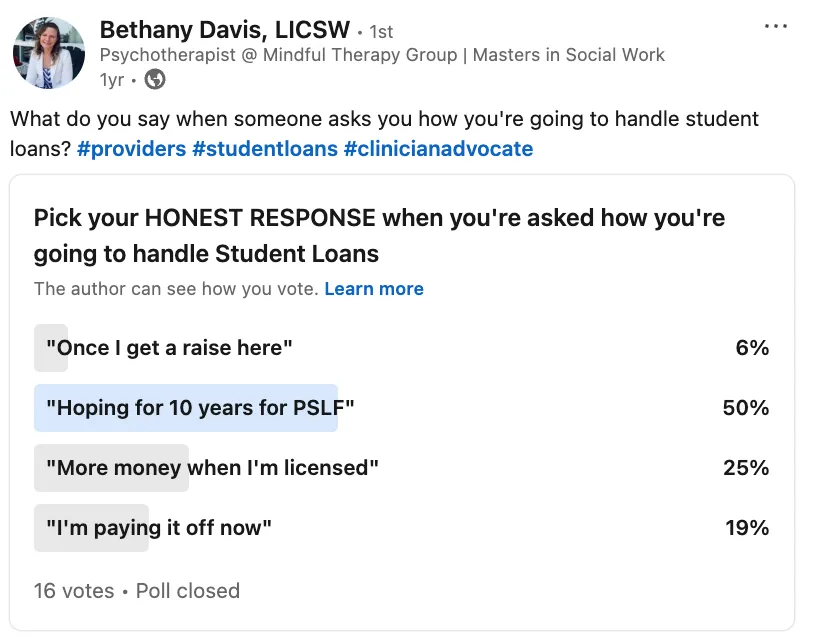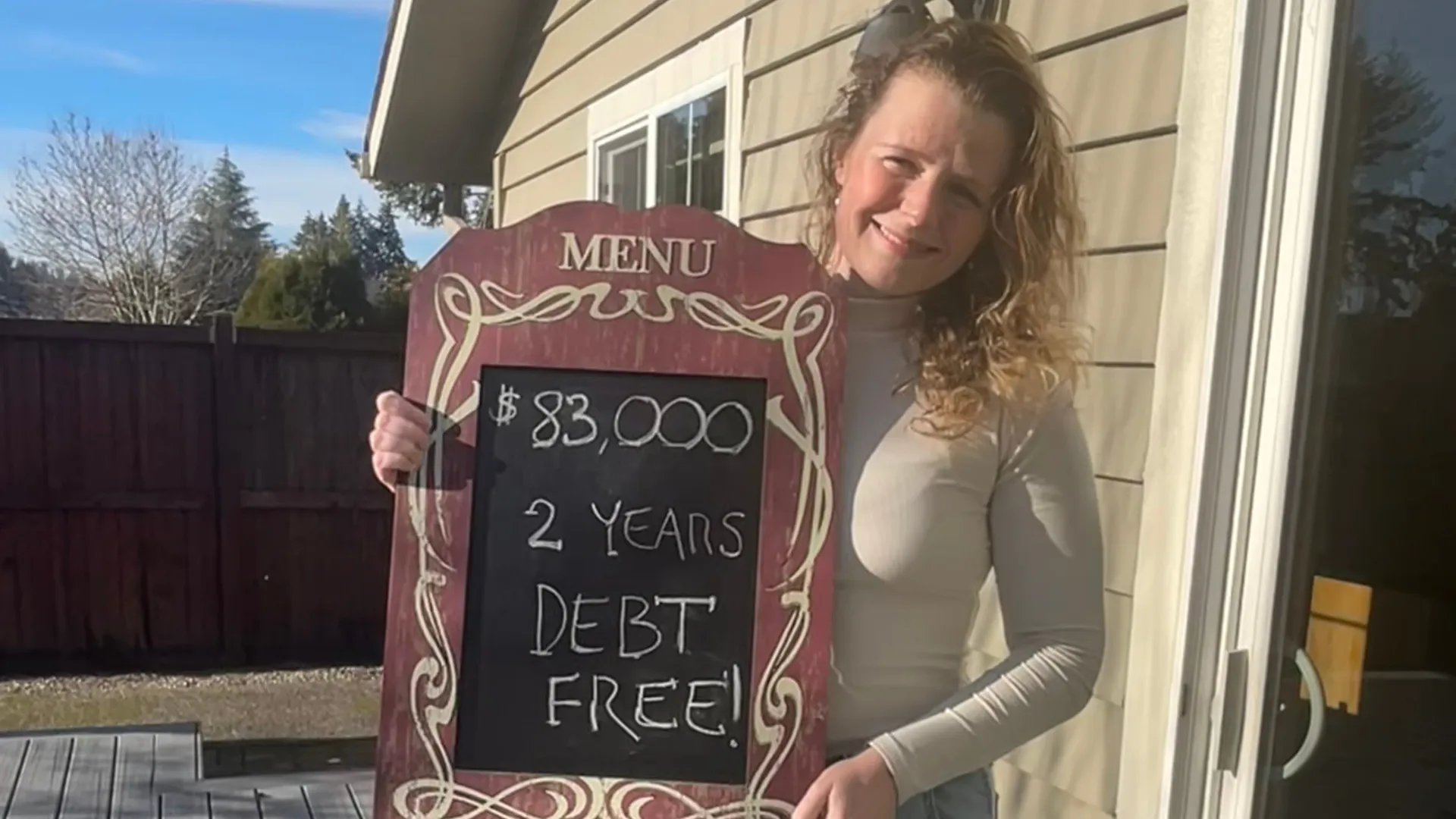"You'll never be able to pay off your loans as a social worker.”
"We're broke social workers."
"Better get used to waiting tables on the weekend."
My name is Bethany Davis. I'm a past Seattleite from the Pacific Northwest. I'm also a licensed independent clinical social worker currently working as a private practice therapist.
And up until a month ago, my student loans, credit cards, personal loans, and car loan wouldn’t let me sleep.
Today, I am debt free. I paid off $83,000 worth of debt in two years. Free at last. I don’t owe anyone anything.
This is a story of my journey of what my debt was like, what changed, and where I am at today.
{{resource}}
Don’t wait for relief
As a therapist, I work with people to change their core beliefs and stories about themselves.
Core beliefs are deeply held beliefs we have about ourselves and the world. They’re the lenses in which we see ourselves and our surroundings. The story of being a “broke social worker” in debt was told to me way before I graduated with my MSW. The lenses of scarcity and depravity were all too familiar with me even before I hit the ground running in my career.
People would ask me about student loans, and I could feel my body freeze up. I shoved all of my debt into a closet, hoping no one would notice it. But I still couldn't get it out of my mind. I knew it was there, knocking from the inside.
With the resumption of student loan repayments, there is a huge story about debt that is socially accepted these days. I would go so far to say it's social helplessness. Having student debt is keeping therapists from buying houses, making plans, or leaving jobs they hate.
I have talked to so many social workers that are at toxic job sites hoping for Public Service Loan Forgiveness (PSLF). A LinkedIn poll I ran showed that 50% of therapists are "Hoping for 10 years for PSLF" in response to their student loans.

While it was a small sample size (n=16), it’s representative of my anecdotal experience. It’s reflected in the data, too. As of 2022, 2.4% of PSLF of applicants actually met eligibility requirements.
Debt wore Prada
When I jumped into private practice coming out of the hospital setting, I made the most money I’ve ever made in my life. I started at $20 an hour in 2018 when I graduated and started working at a skilled nursing facility. My income jumped to $92,000 in my second year in private practice in 2020 with Mindful Therapy Group. I felt like I made it, like I had won the lottery.
I spent everything I had because I felt like I would never have it again. Ironically, I didn’t because I spent every paycheck. But I’m a therapist, and therapists need to be a little glamorous, right? The scarcity mindset latched on to me—there was never enough of whatever was in front of me.
Eating out every night, renting designer clothes, renting cars. Online shopping orders piling up at my door. Hair done on Monday. Hair done again the next Wednesday.
More and more and more. And my loans just stayed in my closet next to my Rent The Runway blazers, waiting for me.
Pick your hard
I knew it was time. I was making more money than I had ever made, but it was all spent at the end of the month.
I packed up my things, called my parents, and told them I was coming home to pay off my debt. I was 30 at the time, moving back in with my family, living in a small town south of Seattle for a year.
I cleaned houses and sold clothes. I hit thrift stores and accumulated collections of dresses to sell at boutiques. I made coffee at home. I know this is a crazy thing to do after living in Seattle, but trust me, it can be done.
I reassessed my subscriptions. I even changed my phone plan. I went on walks with friends and family. I enjoyed simple things in life. I learned how to be bored and not use “things” to entertain myself.
I chose temporary discomfort to gain long term benefits. These two years have been grueling and challenging but are changing the way I view my money and ability to leave debt behind.
{{resource}}
Pen to paper
I wrote down my monthly income and my weekly expenses. I started by listing my debt from smallest to largest, and made payments from smallest to largest, also known as the “Snowball Method.”
After expenses and my monthly budget, the remainder was put on my student loans. I kept hitting "Submit Payment" to Nelnet, my loan servicer, until my fingers went numb.
What’s your ROI?
For many therapists in community mental health and hospital settings, you can’t control how much you work or how much you make. You have a set schedule based on your job description, and sometimes limitations on your ability to work overtime or in another department.
I realized that I needed to increase my return on investment (ROI) for my social work degree, which cost me a whopping $62,000. This meant no more hospital work for me. I needed to switch gears.
I now work as a private practitioner with Mindful Therapy Group. I decide how many clients I want to work with based on my income goals, how long I want to see them for a session, and when I want to work. This autonomy has worked wonders for me in paying off debt. My rate per hour is much higher than the hospital, with no commute and less stress.
If you are a therapist contemplating private practice, I would recommend being supported by a group like Mindful Therapy Group. Everything about my practice, including marketing, credentialing, and billing, is taken care of on the back end, so I have more energy to just see clients without the administrative work.
Don’t quit
I knew that when I was done, it would all be worth it. I had friends and family question my debt pay-off journey, concerned that I was going too hard at it. I had to summit the mountain.
Paying off debt when you’re not in a relationship, when you’re not in it with someone else, can be hard in itself. I had no one to keep me accountable except me. And that can feel lonely sometimes.
I paid off my last debt a month ago. I’ve never felt so proud of myself. My goal now is to save $100,000 and save for a large emergency fund, to make sure I never go back into debt again. I’m continuing to manage my practice with Mindful Therapy Group, and I pride myself in sharing my debt-free journey with other therapists that need a sense of hope.
I’m changing the way I view myself these days: the story of being a broke social worker has quieted. I’m continuing to believe the truth about my value and skill as a social worker and most importantly, a human being. The future looks promising.
—
This post is to be used for informational purposes only and does not constitute legal, business, or tax advice. Each person should consult their own attorney, business advisor, or tax advisor with respect to matters referenced in this post.
Bethany Davis, LICSW utilizes a somatic approach to treating anxiety, depression, and life transition challenges in women. With 10+ years of experience, Bethany focuses on helping clients feel the stories that live in the body rather than running from them. Follow her on LinkedIn here.
{{cta}}
Manage your bookkeeping, taxes, and payroll—all in one place.

Discover more. Get our newsletter.
Get free articles, guides, and tools developed by our experts to help you understand and manage your private practice finances.





